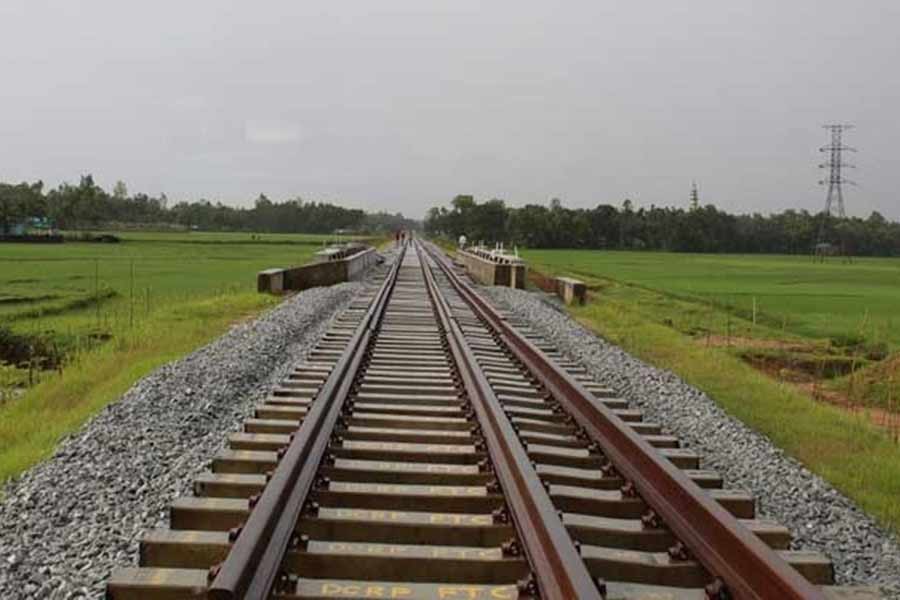Construction of the trans-Asian rail line from Cox’s Bazar’s Ramu to the border union of Ghumdhum has been ‘suspended’ as work on the Myanmar section of the project has not begun.
However, work on the rail line from Dohazari to Ramu is still ongoing.
The Implementation Monitoring and Evaluation Division (IMED) of the Ministry of Planning has suggested the relevant ministry explore if the unutilised funds can be used in other projects, reports bdnews24.com.
But the Bangladesh Railway is pushing for the deadline of the project, which ends in June 2022, to be extended by another two years.
The proposal to extend the deadline without increasing the budget will be sent to the planning ministry soon, the Bangladesh Railway said.
Md Mofizur Rahman, project director, said about 69 per cent of the Dohazari-Cox’s Bazar section is completed.
“But we've received orders from the higher authority to complete the construction of the nearly 101-metre rail tracks from Dohazari to Ramu and start the work for the Ghundhum section later,” he said.
“We've not begun any work on the section from Ramu to Ghumdhum. According to our plans, that second section will only start once the first from Dohazari to Ramu is completed. Work on the second section is suspended for the moment," the project director said.
“The Myanmar authorities have yet to start the work on their part of the rail link project between Bangladesh and Myanmar under the Trans-Asian Rail Network. Once they do, we’ll be able to complete our part of the work quickly and connect the line with the Myanmar side,” he said.
Asked whether the line from Ramu to Ghumdhum has been cancelled, he said: “It isn’t cancelled, but you can say that work is suspended.”
Currently, the construction of the rail section from Ramu to Ghumdhum has been halted due to a lack of funding, said Dhirendra Nath Mazumder, director-general of the Bangladesh Railway.
The Tk 180 billion-project received Tk 131 billion from the Asian Development Bank, with the remaining Tk 41.19 billion coming from the Bangladesh government.
The contract with the ADB says funds are released section by section, the director-general said.
The authorities could start releasing funds for the Ghumdhum section after the work on the Cox’s Bazar part is completed, he speculated.
The IMED officials recently visited the project site and submitted a report saying the government should make the policy decision soon on the second phase of the project, the 28-km tracks from Ramu to Ghumdhum.
It also said the ministry can consider using the surplus funds for the project on other projects like overhauling the rail tracks from Chattogram to Dohazari, and rail communications with the Matarbari Coal Power Plant and Deep Sea Port.
The report substantiated the extension of the deadline, saying the authorities had needed to acquire 552 hectares of land in Cox’s Bazar for the section from Dohazari to Cox’s Bazar via Ramu. But the contractors did not receive the land in time, and therefore, they could not implement the work at the expected pace.
“The Ministry of Railways asked for an extension and we have recommended it after a visit to the site,” said IMED Sector-2 Director General Md Zahir Raihan.
“We also suggested they consider using the surplus budget in other projects in consultation with the ADB.”
The government first approved the project in 2010 and set a deadline of December 2013, only allocating a budget of Tk 18.52 billion.
While implementing the project, it was evident the authorities needed to acquire a total of 700 hectares of land to build the 129-km stretch of rail tracks. A huge amount was needed to acquire this land. The project also ran into other difficulties.
The government then approached the ADB to fund the project. The Manila-based development agency agreed to fund it under the Trans-Asian Railway Network. The first revised budget of the project crossed Tk 180 billion in 2017.
The construction work began in July 2018 after the project was fast-tracked. Chinese contractors China Railway Engineering Group (CRC) and China Civil Engineering Construction Corporation (CCECC), and Bangladeshi contractors Toma Construction Company Limited and Max Infrastructure Limited are implementing the project together.


